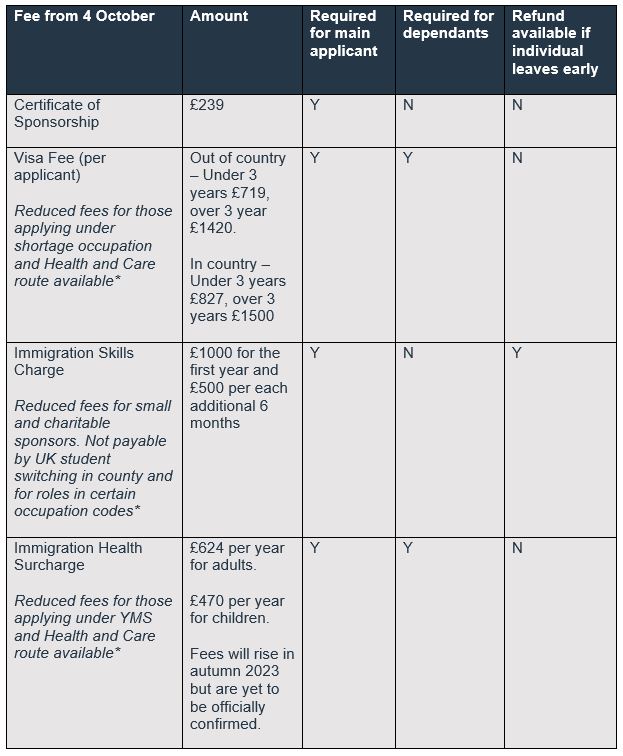UK Immigration Fee Increases: Changes to Skilled Worker and Global Business Mobility Visas
September 29, 2023

Country / Territory
Related contacts

UK Government Affairs Strategy Director
Related insights
Related offices
Related contacts

UK Government Affairs Strategy Director
Related insights
Related offices
Related contacts

UK Government Affairs Strategy Director
Related insights
Related offices
In an age of cost containment, the recently announced changes to the United Kingdom’s immigration fees—while not a surprise—were unlikely to have been welcomed by those in the mobility space.
The fee increases are meant to help fund spending in public services, so the prospect of reversing them seems remote. More positively, this perhaps signifies a move away from a policy to reduce net migration to one encouraging immigration to the UK as a revenue stream. Read our recent blog on fee rises for more insights.
Compared to other immigration systems, the UK’s is transparent, digital, caters to most industries with sponsorship routes having relatively low skills and salary thresholds and, critically, is quick.
However, the system is expensive; company-sponsored routes encompass not only a work permit and visa fee but also levies to the NHS and the Department of Business, Innovation and Skills. Despite this, the continued rise of the use of the Skilled Worker visa suggests that these fees have not been a deterrent for sponsors, and that the UK remains an attractive destination for individuals and businesses alike.
What are the changes?
Fee rises come into force for applications submitted from 4 October 2023. Most rises are between 15-20% but some are more. For example, priority fees have doubled.
This blog focuses specifically on the changes to the Skilled Worker and Global Business Mobility: Senior and Specialist Worker Category visas.

Case study
Jack comes to the UK, sponsored by his employer under the Skilled Worker category, bringing his Partner and two children, younger than 18. The fees would be:
- Certificate of Sponsorship (CoS): £239
- Visa fee for Jack and dependants for five years: £1420 x 4 = £5680
- Immigration Skills Charge: £5000
- Immigration Health Surcharge: £10,940
- Total = £21859 (please note there are potential other charges payable. These could include priority, scanning, etc.)
Savings options
There may be options available to reduce fees when initially hiring new recruits.
It has long been common practice to apply for the longest possible visa available. This has distinct advantages such as certainty, no requirement for extensions and employee experience.
However, if the individual leaves employment particularly before the three-year point, the company has lost the uplifted visa fee and the Immigration Health Surcharge as both fees will not be refunded.
If Jack instead applied for a three-year visa initially, costs would be:
- CoS: £239
- Visa fee for Jack and dependants for three years: £719 x 4 = £2876
- Immigration Skills Charge: £3000
- Immigration Health Surcharge: £6564
- Total = £12,679 (£9,180 cheaper than a five-year visa at the outset)
Of course, Jack may need to extend the visa an additional two years, and the associated costs would be:
- CoS: £239
- Visa fee for Jack and dependants for five years: £827 x 4 = £3308
- Immigration Skills Charge: £2000
- Immigration Health Surcharge: £4376
- Total = £9923 (£743 more expensive than applying for a five-year visa at the outset)
Employer considerations
There is no clear-cut way to ensure that costs are reduced in the long-term by applying for a longer or shorter visa, and employers should be mindful of the administration of an additional application.
However, by using data to project the likelihood of a person staying in a role for the full five years, employers could look to make strategic decisions on the length of visa offered at the outset.
Whilst not a solution for every occasion, the Immigration Skills Charge is not payable under the GBM Senior and Special Worker route where:
- the individual holds an EU or Latvian non-citizen’s passport;
- they normally work in the EU for an EU business but have temporarily transferred work to the UK; and
- transfer is for less than three years.
There is a possible £3000 saving for employers when they need to transfer EU workers from their EU business to the UK.
Unsponsored routes
Whilst the traditional worker routes are attractive for their simplicity, they are, of course, not the only visa options that allow work.
Family route, Graduate, Ancestry, Youth Mobility, High Potential Individual and Global Talent visas (to name a few), all allow work and come with lower fees.
Consulting with a professional may help to explore all available options.
Looking ahead
There is no quick fix to avoiding these fee rises. Ultimately, businesses will likely need to carry out more strategic analysis and planning to help them make the most beneficial decisions when moving individuals to the UK.
The government fees are unlikely to decrease in the near future, but there are considerations that may help navigate them. Fragomen professionals can help businesses prepare using fee calculators and pre-assessments of cases, as well as taking a deeper dive into data and trends to see where policies can be tweaked to result in overall savings.
Need to know more?
For questions or further information, please contact Partners Louise Haycock and Charlotte Wills at [email protected] and [email protected], respectively, Senior Manager Shuyeb Muquit at [email protected] or Manager Kinka Tonchev at [email protected].
This blog was published on 29 September 2023, and due to the circumstances, there are frequent changes. To keep up to date with all the latest updates on global immigration, please subscribe to our alerts and follow us on LinkedIn, X, Facebook and Instagram.
Country / Territory
Related contacts

UK Government Affairs Strategy Director
Related insights
Related offices
Related contacts

UK Government Affairs Strategy Director
Related insights
Related offices
Related contacts

UK Government Affairs Strategy Director
Related insights
Related offices
Explore more at Fragomen

Awards
Partner Cynthia Shearn is recognized by Crain’s Chicago Business in its 2026 Notable Women in Law list, honoring her leadership in immigration and global mobility and her impact within the legal community.

Media mentions
Partner Emily Allen says the new H-1B lottery is driving earlier planning and more detailed preparation.

Blog post
Senior Business Immigration Consultant Ryaihanny Sahrom and Business Immigration Consultant II Fahimah Muhammad examine Indonesia’s newly launched Global Citizenship of Indonesia (GCI) program and its introduction of long-term and indefinite permanent residence pathways for members of the Indonesian diaspora.

Media mentions
Senior Immigration Manager Jonathan Hill notes that tighter UK visa compliance rules and new rating measures create additional challenges for universities.

Video
Partner Diana Quintas outlines key early career visa pathways and practical considerations for employers and graduates navigating entry-level immigration options.

Fragomen news
The Montreal office has added Partner Julie Lessard and Counsel Elsa Agostinho and Sophia Khanzadian to strengthen its immigration services.

Blog post
Destination Services Director Christine Sperr examines how housing market reforms, rent stabilization measures and cost-of-living dynamics in Saudi Arabia are influencing workforce mobility, compensation planning and long-term settlement strategies under Vision 2030.

Blog post
Manager Dr Adela Schmidt and Senior Associate Isabel Schnitzler analyse the European Commission’s infringement proceedings against Germany concerning its Vander Elst visa requirements for third-country nationals providing short-term cross-border services and explain why current compliance obligations remain unchanged.

Blog post
Latin America & the Caribbean Managing Partner Leonor Echeverria, Senior Associates Sarah Blackmore and Sonya Cole and Senior Regional Knowledge Manager Laura Weingort examine renewed energy interest in Venezuela and outline key immigration pathways, procedural constraints and strategic considerations for compliant talent deployment.

Media mentions
Senior Manager Andreia Ghimis highlights how the EU’s new migration strategy could create opportunities for employers while increasing compliance requirements.

Awards
Partner Julia Onslow-Cole is recognised in the Spears 500 guide to leading private client advisers, reflecting her experience advising high-net-worth individuals, families and global businesses on complex UK and European immigration and mobility strategies.

Media mentions
Partner Abeer Al Husseini discusses increased scrutiny of Saudi business visas in AGBI, highlighting stricter review of short-term entry used for operational work and the implications for regional employers.

Awards
Partner Cynthia Shearn is recognized by Crain’s Chicago Business in its 2026 Notable Women in Law list, honoring her leadership in immigration and global mobility and her impact within the legal community.

Media mentions
Partner Emily Allen says the new H-1B lottery is driving earlier planning and more detailed preparation.

Blog post
Senior Business Immigration Consultant Ryaihanny Sahrom and Business Immigration Consultant II Fahimah Muhammad examine Indonesia’s newly launched Global Citizenship of Indonesia (GCI) program and its introduction of long-term and indefinite permanent residence pathways for members of the Indonesian diaspora.

Media mentions
Senior Immigration Manager Jonathan Hill notes that tighter UK visa compliance rules and new rating measures create additional challenges for universities.

Video
Partner Diana Quintas outlines key early career visa pathways and practical considerations for employers and graduates navigating entry-level immigration options.

Fragomen news
The Montreal office has added Partner Julie Lessard and Counsel Elsa Agostinho and Sophia Khanzadian to strengthen its immigration services.

Blog post
Destination Services Director Christine Sperr examines how housing market reforms, rent stabilization measures and cost-of-living dynamics in Saudi Arabia are influencing workforce mobility, compensation planning and long-term settlement strategies under Vision 2030.

Blog post
Manager Dr Adela Schmidt and Senior Associate Isabel Schnitzler analyse the European Commission’s infringement proceedings against Germany concerning its Vander Elst visa requirements for third-country nationals providing short-term cross-border services and explain why current compliance obligations remain unchanged.

Blog post
Latin America & the Caribbean Managing Partner Leonor Echeverria, Senior Associates Sarah Blackmore and Sonya Cole and Senior Regional Knowledge Manager Laura Weingort examine renewed energy interest in Venezuela and outline key immigration pathways, procedural constraints and strategic considerations for compliant talent deployment.

Media mentions
Senior Manager Andreia Ghimis highlights how the EU’s new migration strategy could create opportunities for employers while increasing compliance requirements.

Awards
Partner Julia Onslow-Cole is recognised in the Spears 500 guide to leading private client advisers, reflecting her experience advising high-net-worth individuals, families and global businesses on complex UK and European immigration and mobility strategies.

Media mentions
Partner Abeer Al Husseini discusses increased scrutiny of Saudi business visas in AGBI, highlighting stricter review of short-term entry used for operational work and the implications for regional employers.



